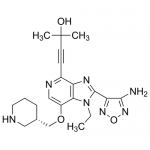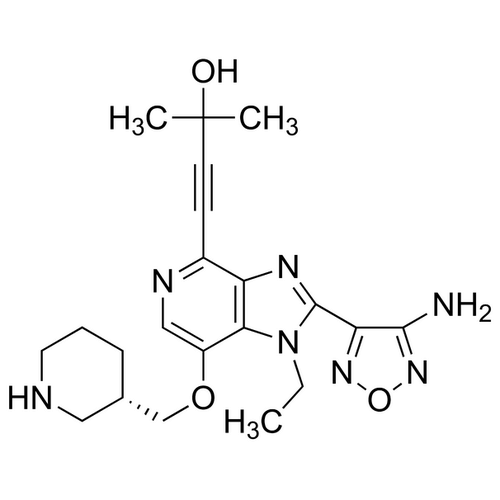| Product Name | GSK690693 Hydrochloride |
| Description |
AKT kinase inhibitor |
| Purity | >98% (HPLC) |
| CAS No. | 937174-76-0 |
| Molecular Formula | C21H27N7O3 |
| Molecular Weight | 425.5 |
| Field of Use | Not for use in humans. Not for use in diagnostics or therapeutics. For in vitro research use only. |
Properties
| Storage Temperature | -20ºC |
| Shipping Temperature | Shipped Ambient |
| Product Type | Inhibitor |
| Solubility | Soluble to 50 mM in DMSO |
| Source | Synthetic |
| Appearance | White to beige solid |
| SMILES | CCN1C2=C(C(=NC=C2OC[C@H]3CCCNC3)C#CC(C)(C)O)N=C1C4=NON=C4N |
| InChI | InChI=1S/C21H27N7O3/c1-4-28-18-15(30-12-13-6-5-9-23-10-13)11-24-14(7-8-21(2,3)29)16(18)25-20(28)17-19(22)27-31-26-17/h11,13,23,29H,4-6,9-10,12H2,1-3H3,(H2,22,27)/t13-/m0/s1 |
| InChIKey | KGPGFQWBCSZGEL-ZDUSSCGKSA-N |
| Safety Phrases |
Classification: Acute toxicity, Oral (Category 3) Safety Phrases: S22 - Do not breathe dust. S24/25 - Avoid contact with skin and eyes. S36/37/39 - Wear suitable protective clothing, gloves and eye/face protection. Hazard statements: H301 Toxic if swallowed. Precautionary statements: P301 + P310 IF SWALLOWED: Immediately call a POISON CENTER or doctor/ physician. |
| Cite This Product | GSK690693 Hydrochloride (StressMarq Biosciences Inc., Victoria BC CANADA, Catalog # SIH-448) |
Biological Description
| Alternative Names | 4-[2-(4-Amino-1,2,5-oxadiazol-3-yl)-1-ethyl-7-[(3S)-3-piperidinylmethoxy)-1H-imidazo[4,5-c]pyridin-4-yl]-2-methyl-3-butyn-2-ol |
| Research Areas | Apoptosis, Cancer, Cancer Growth Inhibitors, Cell Signaling, Tyrosine Kinase Inhibitors |
| PubChem ID | 16725726 |
| Scientific Background | GSK690693 Hydrochloride is an ATP-competitive pan-Akt kinase inhibitor derived from aminofurazan. In neuroscience, Akt signaling is critical for neuronal survival, synaptic plasticity, and metabolism. GSK690693 is used to explore the role of Akt in neurodegenerative diseases, where its dysregulation contributes to apoptosis and impaired cellular signaling. The compound’s antiproliferative and pro-apoptotic effects make it a valuable tool for studying neurodegeneration and therapeutic strategies targeting the PI3K/Akt pathway. |
| References |
1. Heerding D.A., et al. (2008) J. Med. Chem. 51(18): 5663–5679. 2. Rhodes N., et al. (2008) Cancer Res. 68(7): 2366–2374. |



Reviews
There are no reviews yet.